|
|
|
Sort Order |
|
|
|
Items / Page
|
|
|
|
|
|
|
| Srl | Item |
| 1 |
ID:
117778
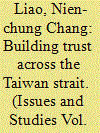

|
|
|
| 2 |
ID:
188388
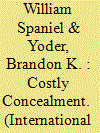

|
|
|
|
|
| Summary/Abstract |
This article presents a formal model that shows how states can credibly reassure each other simply by maintaining a cooperative outward narrative. The reassurance literature to date has focused largely on costly signaling, whereby benign states must distinguish themselves by taking specific actions that hostile types would not. The mere lack of overtly expressed hostility without costly signals has been considered “cheap talk,” on the assumption that this behavior is costless for hostile states and thus uninformative. In contrast, this paper argues that maintaining a cooperative façade while secretly formulating and executing exploitative policies carries inherent trade-offs, and thus constitutes a credible reassurance signal. Foreign policy planning and implementation requires communication among various individuals, groups, and organizations, which has some probability of being observed and punished by outside actors. Yet efforts to conceal the policymaking process and reduce this probability are costly—they require investments in internal monitoring and restrictions on internal communication that can substantially degrade policy outcomes. Thus, to the extent that a state's foreign policymaking process is transparent—that is, that concealing internal communications is difficult—the absence of positive signals of hostility is a credible signal of its benign intentions. The argument is illustrated with a case study of German reassurance signals during the July Crisis preceding World War I.
|
|
|
|
|
|
|
|
|
|
|
|
|
|
|
|
| 3 |
ID:
139036


|
|
|
|
|
| Summary/Abstract |
Since the end of the Cold War, the United States has pursued a two-pronged strategy towards China. On the one hand, Washington has sought to engage Beijing across a wide range of domains, including through bilateral diplomacy, participation in multilateral institutions, trade, investment, scientific cooperation, educational and cultural exchange, civil-society initiatives and military-to-military dialogues. While activity in most of these areas extends back to the initial Nixon–Kissinger ‘opening’ to China in the late 1960s, since the early 1990s there has been a substantial broadening and deepening in each.
|
|
|
|
|
|
|
|
|
|
|
|
|
|
|
|
| 4 |
ID:
143017
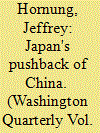

|
|
|
|
|
| Summary/Abstract |
Bilateral relations between China and Japan are in a state of disrepair.1 The current nadir began on September 7, 2010, when the Chinese fishing trawler Minjinyu 5179 collided into two Japan Coast Guard vessels in waters near the Japanese-administered Senkaku Islands (Pinnacle Islands in English). Following the arrest of the captain, Beijing cancelled meetings and cultural exchanges, demanded apologies as well as compensation for holding him, and repeatedly summoned Japan's ambassador. Beijing even restrained Japan-bound rare-earths’ exports and subjected many Japanese imports to lengthy customs inspections. Subsequent events sunk ties to new lows, including Tokyo's September 2012 purchase of three of the Senkaku Islands from their private Japanese owners and Beijing's November 2013 declaration of an expansive Air Defense Identification Zone (ADIZ) that overlaps considerably with Japan's (including the Senkakus). Peppered in-between have been derisive statements by officials, for example when their ambassadors to the United Kingdom compared each other's country to Lord Voldemort, the antagonist in the Harry Potter series, in dueling January 2014 op-eds in Britain's The Telegraph.
|
|
|
|
|
|
|
|
|
|
|
|
|
|
|
|
| 5 |
ID:
177622
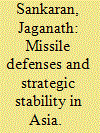

|
|
|
|
|
| Summary/Abstract |
The contention over the quantity and quality of regional missile defenses forward-deployed by the United States in the Asia-Pacific region animates much of the US–China disagreement about strategic stability. The Chinese argue that the deployed assets exceed reasonable defensive requirements and suggest that if these missile-defense deployments continue, they will be forced to increase the size of their nuclear arsenal. In disagreement, the United States claims that regional missile defenses are defensive by design, limited in scope, and necessary to defeat a North Korean missile campaign. In this article, a series of simulation experiments were developed to empirically test these opposing arguments over missile defenses and strategic stability. The simulations indicate that current deployments are necessary for defense and proportional to the threat. The analysis also argues that current deployments do not possess the ability to alter the US–China strategic nuclear balance significantly. The article concludes with a discussion of other subjective aspects of national security that may explain Chinese concerns and explore possible ways to reassure China.
|
|
|
|
|
|
|
|
|
|
|
|
|
|
|
|
| 6 |
ID:
171167
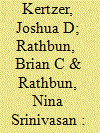

|
|
|
|
|
| Summary/Abstract |
Canonical models of costly signaling in international relations (IR) tend to assume costly signals speak for themselves: a signal's costliness is typically understood to be a function of the signal, not the perceptions of the recipient. Integrating the study of signaling in IR with research on motivated skepticism and asymmetric updating from political psychology, we show that individuals’ tendencies to embrace information consistent with their overarching belief systems (and dismiss information inconsistent with it) has important implications for how signals are interpreted. We test our theory in the context of the 2015 Joint Comprehensive Plan of Action (JCPOA) on Iran, combining two survey experiments fielded on members of the American mass public. We find patterns consistent with motivated skepticism: the individuals most likely to update their beliefs are those who need reassurance the least, such that costly signals cause polarization rather than convergence. Successful signaling therefore requires knowing something about the orientations of the signal's recipient.
|
|
|
|
|
|
|
|
|
|
|
|
|
|
|
|
| 7 |
ID:
168281
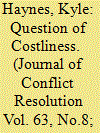

|
|
|
|
|
| Summary/Abstract |
This article examines how interstate signaling processes operate under multiple dimensions of uncertainty. The existing signaling literature largely assumes that states communicate and infer one another’s intentions in a simplified context where they are only uncertain about one component of the other’s preferences. Relaxing this unrealistic assumption, I develop a model of interstate reassurance in which the receiver is uncertain of both the compatibility of the sender’s goals and its time horizons. If a receiving state is unsure of the sending state’s time horizons, it is more difficult to determine the costliness of a given signal, and thus how credible it is as an indicator of the sender’s preferences. I show that under certain conditions, shorter time horizons lead to more credible signaling as states become less willing to incur the short-term costs of misrepresentation. Under other conditions, however, shortened time horizons can incentivize hedging behavior, thus undermining a benign state’s ability to credibly signal its intentions. Finally, the model reveals that multidimensional uncertainty can actually facilitate cooperation across a wider range of conditions than one-dimensional uncertainty. I present two brief case illustrations and discuss the model’s implications for contemporary US–China relations.
|
|
|
|
|
|
|
|
|
|
|
|
|
|
|
|
| 8 |
ID:
095129
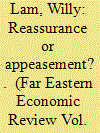

|
|
|
| 9 |
ID:
192169
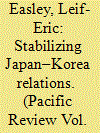

|
|
|
|
|
| Summary/Abstract |
By the time Prime Minister Abe Shinzo and President Park Geun-hye took office, Japan-South Korea relations were already experiencing a downturn over history issues and Lee Myung-bak’s unprecedented presidential visit to the disputed islets of Dokdo/Takeshima. Park’s refusal to hold a bilateral summit became the symbol of strained ties. Then on November 2, 2015 — 980 days after taking office — Park met Abe for bilateral talks in Seoul. On December 28, the two sides declared a rapprochement with an agreement supporting survivors of wartime brothels. Tensions worsened again during President Moon Jae-in’s term (2017–2022), contradicting the narrative that leaders had turned relations around in late 2015. Yet the diplomatic relationship was not on a downward spiral. Japanese and Korean policymakers managed to put a floor under their interactions owing to three stabilizing mechanisms that operated during both the Park and Moon administrations. First, political elites practiced mutual restraint to limit vicious cycles of nationalist recriminations. Second, Tokyo and Seoul carefully calibrated policies toward Beijing while avoiding divergence from each other. Third, reassuring the United States about the cost-effectiveness of its alliances involved trilateral cooperation that also helped stabilize Japan-South Korea relations.
|
|
|
|
|
|
|
|
|
|
|
|
|
|
|
|
| 10 |
ID:
187556


|
|
|
|
|
| Summary/Abstract |
Mistrust is a common cause of conflict between individuals belonging to different identity groups. When can such mistrust be overcome? We present a theoretical model of trust-building across social identity groups to address this question. Trust between groups increases when individuals in one group are willing to take a chance on engaging with members of the other group, their engagement is positively reciprocated, and they are able to credibly communicate the experience to their fellow group members, thereby increasing their belief that members of the other group are trustworthy. This process is made easier if the individuals are not too hostile to the out-group, are flexible enough to change their beliefs in response to new information, and are sufficiently attached to their own group to be honest about their experiences with out-group members.
|
|
|
|
|
|
|
|
|
|
|
|
|
|
|
|
| 11 |
ID:
157312


|
|
|
|
|
| Summary/Abstract |
Donald J. Trump, the current President of the United States, raised serious questions over the legitimacy of the US defense spending in the Asia Pacific region in his campaign. Why should the US be the policeman of the world? Why should the US rush to protect Japan or South Korea in case of any attack if they will not do the same?
|
|
|
|
|
|
|
|
|
|
|
|
|
|
|
|
| 12 |
ID:
179538
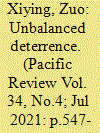

|
|
|
|
|
| Summary/Abstract |
After Tsai Ing-wen was elected, both Mainland China and the United States realized that the situation in the Taiwan Strait has undergone fundamental changes. In order to curb Taiwan’s independence policy, the Mainland China has strengthened its coercive threats against Taiwan while the US chose to increase its strategic commitment to Taiwan and revisit the One-China policy. This article argues the current framework between China and US on Taiwan issue is collapsing. The rising of Mainland China is the root cause for this round tension, however, Tsai Ing-wen refused to accept the 92 consensus which was the trigger. This article elaborates the argument that the delicate balance in the Taiwan Strait is declining, which both China and the United Stated have increased their deterrent threats to each other while decreased their reassurances, and regional crisis is emerging. For the leaders of China and the United States, it is urgent to manage the emerging Taiwan Strait crisis and prevent the situation from going out of control.
|
|
|
|
|
|
|
|
|
|
|
|
|
|
|
|
| 13 |
ID:
113865
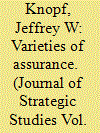

|
|
|
|
|
| Publication |
2012.
|
| Summary/Abstract |
Strategies that seek to assure other states about their security have the potential to reduce international conflict and dissuade states from seeking nuclear weapons. Yet, relative to other tools of statecraft such as deterrence, assurance remains understudied. To facilitate further empirical research on assurance strategies, this article identifies variations in the terminology scholars and policymakers have used to refer to such strategies and describes the concept of assurance associated with each variant. It seeks to clarify and standardize usage and show that there is a general, overarching concept of assurance that links the different variants. It also summarizes existing bodies of empirical research that are relevant to assessing the utility of different forms of assurance.
|
|
|
|
|
|
|
|
|
|
|
|
|
|
|
|
|
|
|
|
|